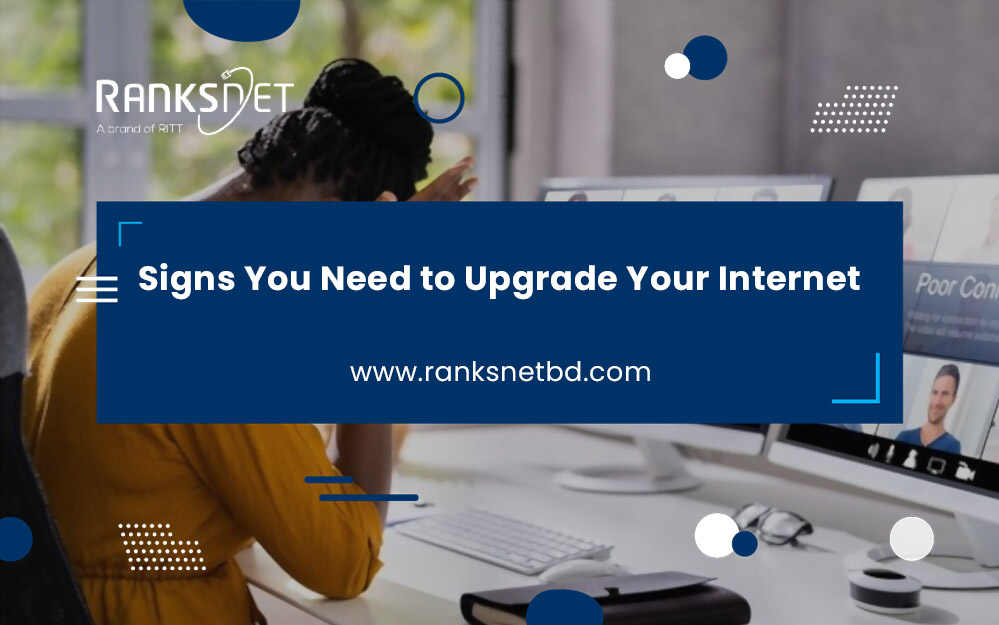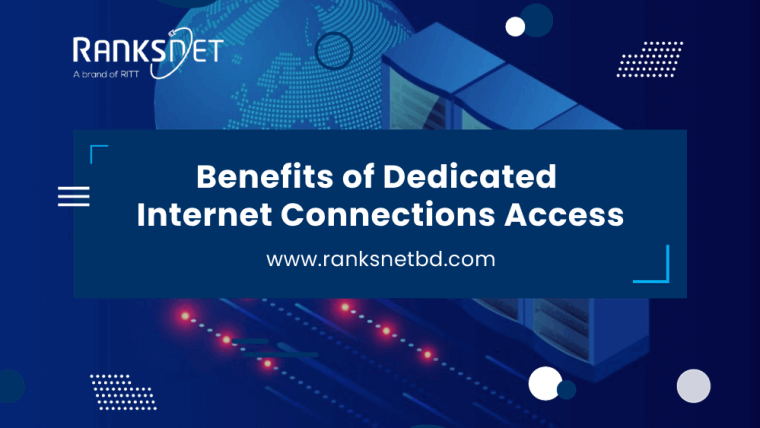Can we really imagine ourselves without the internet these days? Well, in an era where our lives revolve around digital connectivity, we can’t really imagine our daily life without an internet connection. Having a fast and reliable internet connection has become essential.
As technology advances and our online activities grow, there comes a time when your current internet setup may no longer keep up with your needs. Slow loading times, buffering videos, and frequent connection drops are just a few signs that indicate it’s time to upgrade your internet.
With increased download and upload speeds, you can seamlessly stream high-definition content, join video conferences without interruptions, and engage in online gaming with reduced latency.
In this comprehensive guide, we’ll know about the telltale signs that indicate your internet is due for an upgrade. Also, discuss the benefits of upgrading, different connection types to consider, and provide practical tips for choosing the right internet package for your specific needs.
6 Signs You Need to Upgrade Your Internet for a Better Online Experience
Whether you’re a remote worker, a passionate gamer, or a streaming enthusiast, a faster and more stable connection can significantly enhance your online experience.
If you recognize the signs of upgrading your internet connection and take all the necessary steps, you can unlock and enhance your online experience significantly. Let’s check out the reasons:
1. Slow Loading Times and Buffering
One of the most obvious signs that you need to upgrade your internet is experiencing slow loading times and constant buffering.
If web pages take forever to load, streaming videos constantly pause to buffer, or online games lag frequently, it’s a clear indication that your current internet connection is struggling to keep up.
Slow loading times and buffering can be attributed to insufficient bandwidth, which refers to the maximum amount of data your connection can handle at a given time.
As our online activities have become more data-intensive, such as streaming high-definition content or engaging in bandwidth-demanding applications, it’s crucial to have adequate bandwidth to ensure smooth and uninterrupted experiences.
Upgrading your internet plan to one with higher bandwidth can alleviate these issues. Higher bandwidth allows for faster data transfer, reducing loading times and eliminating buffering. W
ith a speedier connection, webpages will load instantaneously, videos will stream seamlessly, and online games will respond more quickly, providing you with a frustration-free online experience.
We have a detailed guide about how to increase your internet speed.
2. Frequent Connection Drops
Are you constantly plagued by sudden internet connection drops? If your internet connection frequently disconnects, forcing you to manually reconnect or wait for it to stabilize, it’s a strong indicator that an upgrade is in order.
Frequent connection drops can be caused by various factors, such as outdated equipment, signal interference, or inadequate infrastructure. These disruptions not only interrupt your online activities but can also lead to data loss, affecting productivity and causing frustration.
Upgrading your internet can help address these connection drop issues. Internet service providers often offer newer and more advanced equipment that can provide a more stable and reliable connection.
Additionally, upgrading to a better connection type, such as fiber-optic or cable, can reduce signal interference and improve overall network performance.
By investing in a more stable and reliable internet connection, you can enjoy uninterrupted online experiences and eliminate the frustration caused by frequent connection drops.
3. Insufficient Download and Upload Speeds
If you find yourself waiting an eternity for files to download or struggling to upload large files or videos, it’s a clear sign that your internet speeds are not up to par.
In today’s fast-paced digital landscape, having sufficient download and upload speeds is essential for productivity and convenience.
Slow download speeds can make simple tasks like downloading files, software updates, or streaming content a painstakingly slow process. Similarly, insufficient upload speeds can hinder activities like sharing large files, participating in video conferences, or uploading content to social media platforms.
Upgrading your internet plan to one with faster download and upload speeds can make a world of difference. With faster download speeds, you can quickly access and enjoy online content without waiting endlessly.
Improved upload speeds allow you to share files, participate in video calls, and interact with others online more efficiently.
If you upgrade to a plan that offers higher download and upload speeds, you’ll experience increased efficiency, reduced waiting times, and seamless interactions with the digital world.
We have an article that discusses the difference between download and upload speed.
4. Unreliable Wi-Fi Coverage
Another sign that indicates the need for an internet upgrade is unreliable Wi-Fi coverage. If you notice that certain areas of your home or office have weak or no Wi-Fi signal, it can severely limit your ability to stay connected and productive.
Weak Wi-Fi coverage can be caused by factors such as distance from the router, physical obstructions like walls or floors, or outdated router technology. This can result in frustrating dead zones where you struggle to connect to the internet or experience sluggish speeds.
Upgrading your internet can help improve Wi-Fi coverage by providing you with a more advanced router or Wi-Fi system. Newer routers offer better range and stronger signals, ensuring that you have a consistent and reliable connection throughout your space.
Also, mesh Wi-Fi systems can be installed to eliminate dead zones and extend coverage to every corner of your home or office.
5. Multiple Users and Devices Straining the Network
If you live in a household or work in an environment where multiple users and devices are simultaneously connected to the internet, you may experience network congestion.
Network congestion occurs when the demands placed on the network exceed its capacity, leading to decreased speeds and overall performance.
Common scenarios that contribute to network congestion include streaming on multiple devices, online gaming, video conferencing, or large file downloads happening concurrently.
If you notice a significant slowdown in your internet speeds during these peak usage times, it’s a clear indication that your current internet plan may not be able to handle the load.
Upgrading your internet to a higher bandwidth or speed tier can help alleviate network congestion. A plan that offers greater capacity and bandwidth can accommodate multiple users and devices, ensuring that everyone can enjoy a smooth and uninterrupted online experience.
Also, consider routers with advanced Quality of Service (QoS) features that prioritize certain types of network traffic. This can help allocate bandwidth more efficiently, giving priority to time-sensitive activities like video conferencing or online gaming.
If you upgrade your internet to support multiple users and devices, you can prevent network congestion, maintain fast speeds, and ensure a seamless online experience for everyone involved.
6. Implementing New Technologies and Services
As technology continues to advance, new online services, applications, and technologies emerge that require higher internet capabilities. If you find yourself wanting to explore and take advantage of these innovations but feel limited by your current internet connection, it’s a sign that upgrading is necessary.
For instance, emerging technologies like virtual reality (VR) and augmented reality (AR) rely on high-speed internet connections to deliver immersive experiences. Similarly, cloud-based services, online backups, and video editing platforms require fast upload and download speeds to ensure smooth operation.
By upgrading your internet, you open the door to embracing these new technologies and services. You can fully engage in VR gaming, explore the wonders of AR applications, and take advantage of cloud-based solutions without limitations.
Upgrading allows you to stay at the forefront of technological advancements and unlock the full potential of the digital world.
Read our article for choosing right internet deals for your home.
Conclusion
Upgrading your internet is a crucial step in enhancing your online experience. If you can identify the signs that indicate the need for an upgrade—such as slow loading times, frequent connection drops, insufficient speeds, unreliable Wi-Fi coverage, network congestion, and the desire to try new technologies—you can take proactive steps to ensure that your internet connection meets your current and future needs.
Consider reaching out to your internet service provider to explore available options and packages that offer faster speeds, higher bandwidth, and improved stability.
Assess your specific requirements, such as the number of users and devices, the type of online activities you engage in, and your budgetary considerations, to select the most suitable internet plan.
Frequently Asked Questions
What factors should I consider when choosing an internet plan?
When choosing a new ISP, consider factors such as the available internet speeds, reliability and stability of the network, customer reviews and ratings, pricing and contract terms, and the level of customer support provided. It’s also important to check if the ISP operates in your area and if they offer the necessary infrastructure (such as fiber optic or cable) to support high-speed internet connections.
What are some other indicators that my internet is due for an upgrade?
If you have multiple devices connected to your network and notice a significant drop in internet speed when they are all in use, it could be a sign that your current internet plan is unable to handle the increased demand. Additionally, if you’re constantly reaching or exceeding your data cap or if your current internet provider does not offer the required bandwidth for your needs, upgrading might be necessary.
How do I determine the appropriate internet speed for my needs?
Consider the number of devices connected to your network, the activities you frequently engage in (such as streaming, gaming, or video conferencing), and the number of users simultaneously accessing the internet. It’s recommended to choose an internet plan that provides sufficient bandwidth to support your usage without experiencing significant slowdowns.
Can I upgrade my internet without changing my internet service provider (ISP)?
In some cases, you may be able to upgrade your internet plan with your existing ISP. Check with your ISP to see if they offer higher-speed plans or if they have any promotional offers available for existing customers. However, if your current ISP cannot provide the desired speeds or if there are better options available in your area, you may need to switch to a different provider to upgrade your internet.



